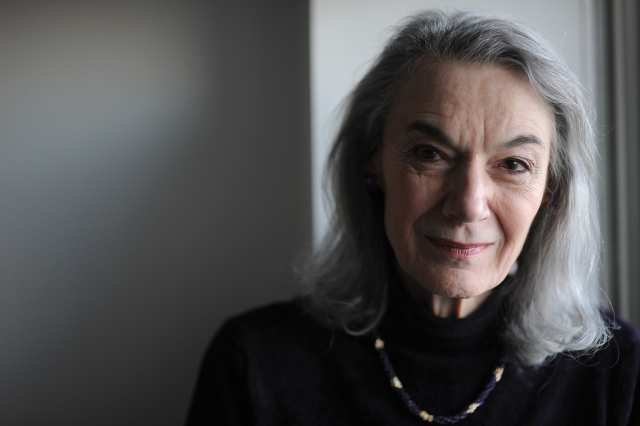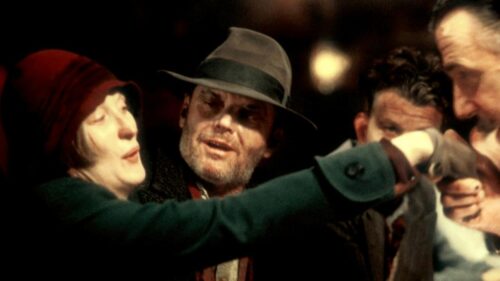It was only when she reached her sixties that Marian Seldes finally started to become appreciated for what she was: a rare and sensitive actress who was a beacon and example for everyone who worked in the theater. She approached the theater like a nun approaches Christ, with reverence, awe, wonder. “The theater is my utopia,” she once told me. There she would be at every opening, resplendent in her purple velvet outfit, as excited as a schoolgirl over what she might see that night. Quite often, I would stop watching the play we were seeing and start watching her vibrating reactions to it in the audience. She had a way of taking everything in that was so sweet, and nearly comic, but saved from that by her romantic intensity, her laser-like focus, her concentration, which would not waver. Her story is the story of someone who was made to wait, and wait. It is a story of drudgery, of ruined hopes, and of abiding patience that was finally and amply rewarded.
I first met Marian when I wrote a rave review of her detailed and flamboyant performance in a 2000 revival of George Kelly’s “The Torch-Bearers.” One day I came home and heard this message on my machine, in a very dramatic, whispery voice: “Dan Callahan….this is Marian Seldes…I wanted to tell you that I just saw your review and oh! It took my breath away.”What was wonderful about that message was that she actually took a gasp before saying, “It took my breath away.” She wanted me to know that her breath had literally been taken away. Too dramatic? Maybe. That’s sometimes what was said about her work. But why not? Let everybody else be naturalistic. Marian was theatrical on stage, over the top, even, and in life she was like that, too, but in a quieter, more knowing way. There was some humor and self-awareness, I felt, in the way she reacted to things and people. She was in her seventies when I knew her, and very grand in manner and bearing, but always there was something of the little girl about her, the little girl sitting at her father’s knee and listening to him talk about the theater, her utopia, or reading about Isadora Duncan and wanting to be bold as she was, as inspired, as heedless.
She was the daughter of Gilbert Seldes, a major cultural critic whose book “The Seven Lively Arts”is still a staple of film studies, and she grew up in a very creative environment. At the age of twenty, she made her Broadway debut in Judith Anderson’s legendary performance of Euripides’ “Medea,” playing a handmaiden. Seldes did the run on Broadway and also the tour, and it was not easy. From the very beginning, she had to learn patience and forbearance, for Anderson was a suspicious tyro who would bawl out anyone if they moved on her lines. She worked with Katharine Cornell in a tour of “That Lady” and played with Tallulah Bankhead in the ill-fated Tennessee Williams play “The Milk Train Doesn’t Stop Here Anymore.” She gathered a reputation as someone who could handle the more difficult actresses, help and support them, uncomplainingly, raptly, with devotion, no matter how crazy it got, and it got pretty crazy with Bankhead. She began to get parts in movies, but they were often thankless. In Nicholas Ray’s “The True Story of Jesse James” (1957), Seldes is there and acting away but wooden pretty boys Robert Wagner and Jeffrey Hunter clasp their hands so that her face is obscured for quite some time in one scene, and this was symbolic of the way she was often treated in film and in the theater. She told me that Frank Borzage, that great director of romance, gave her no direction in “The Big Fishermen”(1959) but simply grabbed her behind and pushed her into her scene.
Seldes worked a lot in TV, playing a handmaiden to Kim Stanley as Cleopatra, waiting and then waiting some more for her chance to make an impression. At close to forty, she won a Tony for her performance as Julia, the difficult daughter, in Edward Albee’s “A Delicate Balance,” forging a bond with him that would flower later for her. But she had serious setbacks, too. “As the lost lady who has delusions of being an actress, Marian Seldes made the cliche of the homely culture vulture fresh and new all over again,” wrote William Goldman in his book “The Season” of her performance in a flop called “Before You Go.” But then he went on to say that she was “a tall, gawky, graceless thing and she is playing a tall, gawky, graceless thing,” and this wouldn’t do, he wrote, for the popular theater. Seldes in this middle period had no glamour, it seems, or no way of idealizing herself. She played outcasts in a way that was too close to the bone.
And there is no doubt that she gave herself airs, and this was not something that was looked on kindly in a young or middle-aged woman. In 1971, she had a part written for her in a play called “Father’s Day,” and she felt, finally, like this play and part might make her a star, like Anderson and Cornell. “This part might be the one to rescue me from ‘featured’ or ‘supporting’ parts,” she wrote in her memoir “The Bright Lights.” But it was not to be. The play opened and closed after one performance, yet Seldes was nominated for a Tony for that one performance, which she was told the following day at the theater, when they knew they wouldn’t be going on. “I leaned against the building and began to cry,” she wrote. “A mixture of rage and self-pity and exhaustion…I had counted on this play for four years and before it had a chance to live it was dead.”
Seldes bided her time and began teaching at Juilliard, where she coached Kevin Kline, Patti LuPone, and many other prominent actors over the years. She went to all of their performances, she was there with good, solid, constructive notes, she was still devoted to the theater, even if the theater kept betraying her and keeping her back. She played in “Equus” for many years, and she got into the Guinness Book of World Records for never missing any of the 1,809 performances of “Deathtrap.” If they weren’t going to offer her star parts, at least she would be noted for her old-school theater devotion to going on and playing no matter what. On film, she was Harvey Keitel’s disturbed mother in James Toback’s “Fingers” (1978), giving the audience the entirety of this woman’s twisted, disappointed, battered life in a single scene. It’s probably the best thing she ever did on film, an opportunity that she took and made into something unforgettable.
And then, finally, as she came up on sixty, Seldes started to get parts on stage that were worthy of her talent, in plays like Tina Howe’s “Painting Churches.” But it was her performance in Edward Albee’s “Three Tall Women” in 1994 that changed the way people looked at her. In speaking to others who knew her in all stages of her life, it became clear to me that Marian had been something of a figure of fun to fellow actors, playwrights and directors, the eternal stage struck girl, waiting and waiting for decades for her chance. And maybe she needed to become an old woman before her extravagant manner could be taken seriously, or at least be taken at all. When I knew her, she was working all the time, anywhere she could. I used to joke with friends that Marian knew all the parts that were being played in town and that she was ready to go on in any of them at the drop of a hat.
I would write to her and she would write back to me on the special stationary that she had printed up at every theater she played in, with her name and the name of the theater on the top. This is what Katharine Cornell used to do, she told me, and it was great fun to see her reviving traditions for herself that had gone out with Cornell. She seemed to be everywhere in New York in the early aughts, doing readings, attending dinners, reciting poetry, making her presence felt. I even felt moved to write a play for her, and she very kindly read it and offered very sharp feedback. “Dan Callahan…this is Marian Seldes…I’ve just read your play, and now I’ve read it again, and I want to talk to you about it!” And we did. I loved that she would always say my full name and then her full name. As if it could be anyone else!
She was fierce and knowing and so sensitive still in so many plays at that time: Albee’s “The Play About the Baby,” Harry Kondoleon’s “Play Yourself,” even Samuel Beckett’s hellishly difficult “Not I.” And she wanted all of them to run for a year or more and was always very disappointed when they didn’t. She wanted to play the play, she wanted to live in that world she could control. She has 103 credits on IMDb, but most of the TV and film work she got was unworthy of her, and she knew it. One of the last times I talked to her, she told me, “I’m not going to do those little parts anymore on film. I feel I can do anything now! I want to do something significant on film. I’m sure I could.” It was not to be, unfortunately. The last time I saw her, in 2010, she was sitting by herself after a play, and her face seemed to be somehow emptied out. She seemed lost, and I knew I shouldn’t approach her in that state. It was the beginning of the dementia that would take her away from the stage, away from the long-delayed love she had enjoyed the past fifteen or so years.
Seldes married twice. The first husband, Julian Claman, was very abusive to her, something she said she wasn’t prepared for, but she did have a daughter with him, Katharine, named for her idol Cornell. And then, years later, she married Garson Kanin, from 1990 to 1999, and she often said that being married to such a seasoned storyteller gave her more confidence in herself. And so it all came together for her as a woman in her sixties, both career and personal life. Not many performers ever had to wait as long as she did for stardom, and not many performers were as universally beloved as she was. Yes, people would still laugh about her grandeur, but the laughter was accepting, whereas once it was not.
Marian was one of those larger-than-life people who give life more intensity, more texture. She can not be forgotten by anyone who knew her, or anyone who saw her play on stage. Those expressive hands! That whispery voice! Those all-seeing eyes of hers! She made an impact on everyone around her. In a certain period in New York, when she had come into full flower at last, she was always there, always hungry, always waiting for the next part, always so romantic about her vocation. It should have all happened for her sooner, but she knew that she was lucky she had lived long enough for it to happen at all. She took your breath away.












